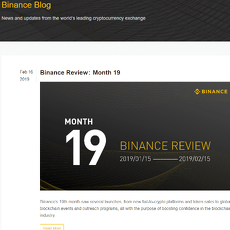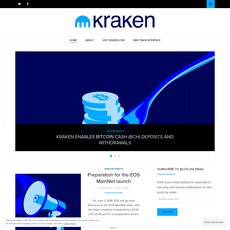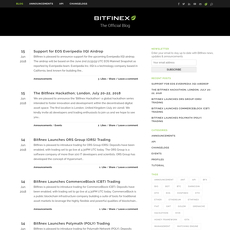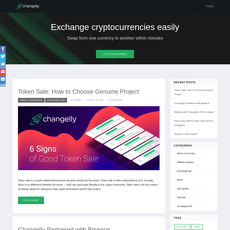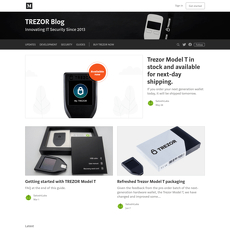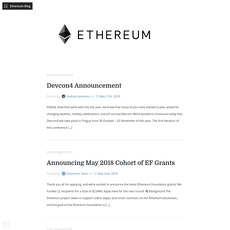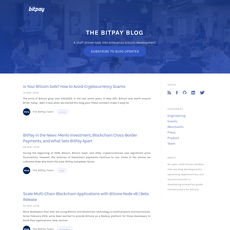Gemini Blog Review
Gemini Blog
gemini.com
Gemini Blog Review Guide: Everything You Need to Know (+ Answers to Top Questions)
Can you actually trust a crypto blog to teach you something valuable—or is it all just recycled hype? If you’ve ever scrolled through headline after headline and still felt totally lost, you’re not alone. The crypto universe is exciting, but, let’s be real, it’s overflowing with confusing jargon, shallow updates, and advice you need a grain of salt (or a whole shaker) to swallow.
Why Quality Crypto Blogs Matter—And What’s Holding You Back
If you’re anything like me, you want more than just a tweet-length update about Bitcoin’s price or the latest meme coin drama. When I first started, half of what I read felt barely researched, packed with buzzwords, or just didn’t tell the whole story.
- Information overload: New crypto articles pop up every second. Who has time to check them all?
- Expert “wannabes” everywhere: Some “advice” comes from folks who barely know their ERC-20 from their ENS domain.
- Fluff, not facts: It’s tough to find blogs that cut past the clickbait and get straight to the stuff that actually matters for your wallet.
Turns out, even experienced traders get stuck sifting through layers of nonsense before finding a single actionable tip. Sound familiar?
Here’s What You’re Looking For (And How I’ll Help You Find It)
Let’s nail down what you want from a solid crypto blog. I get asked these exact things all the time:
- Is it safe to rely on?
- Do they explain tough stuff in a way that makes sense?
- When something major happens (think the Gemini Earn fallout), does the blog actually help you understand it?
You deserve a clear, honest guide—not just another marketer in disguise. So, I'm breaking down the Gemini blog in plain English. I’ll go past the headlines, pull up real examples, and even tackle the hot questions everyone’s Googling right now (yep, even the weird ones).
The Value of Good Crypto Blogs (Not Just News)
Ever read a “breaking” headline that just left you scratching your head?
“Gemini Integrates New Security Feature Amidst Market Turmoil”—wait, but what does that mean for me? Should I do something different with my funds?
That’s where real crypto blogs step up. They’re not just pumping out the latest numbers—they’re actually helping you understand what’s happening and why it matters. Blogs like Gemini’s don’t just echo news—they explain it, connect the dots, and (if they’re doing their job) give you the info you need to make better decisions, whether it’s about moving coins, staying alert after a security breach, or learning what the heck “staking” even means.
One recent study showed that over 60% of crypto users rely on exchange blogs and official resources to make major decisions—not just Telegram groups or Reddit threads. It’s proof that a good blog can make a big difference, especially when it’s actually written for humans (not bots or insiders).
Curious if Gemini’s blog lives up to that hype? Or want to see who they really write for—pros, beginners, or somewhere in between?
Stick around, because next I’m pulling back the curtain on exactly what the Gemini blog covers, who it’s really for, and why these crypto giants bother running blogs in the first place. What’s the real story behind big exchange blogs—and do they actually care if you learn something, or just want your attention? Let’s take a closer look…
What Is the Gemini Blog and Who Is It For?
Gemini Blog at a Glance
First things first—Gemini is a well-known crypto exchange started by the Winklevoss twins (yes, the Facebook guys). Their blog? Think of it as the official voice straight from the horse’s mouth. What you’ll find on the Gemini blog isn’t just news, but a library of updates about their products, security tips, guides to new crypto tokens and more. It’s not just for hardcore crypto traders; I’ve seen everything from “What is Ethereum?” explainer posts to deep dives into NFT regulations.
The real magic? It speaks to just about everyone:
- New to crypto? Expect step-by-step tutorials, friendly intros, and FAQ-style pieces.
- Already active? You’ll find market reports, analysis, and insight on trending coins.
- Security fiend? They post about hacks, threats, and how to stay safe—often before slower-moving news outlets pick it up.
“Education is the most powerful weapon which you can use to change the world.” – Nelson Mandela. Feels spot on for anyone still doing that late-night crypto research run.
Why Big Crypto Firms Run Their Own Blogs
You might wonder: Why do giants like Gemini, Coinbase, or Kraken bother running blogs? Simple—they want trust. We’ve all seen what happens on crypto Twitter: constant drama, rumors, FUD. By publishing articles under their own banner, companies take control of their story, react quickly to rumors, and educate users on confusing terms or sudden platform changes.
Unlike big crypto news sites (think CoinDesk or The Block), a blog like Gemini’s is focused on their own stuff first—new features, fee updates, or wallet announcements. Sometimes, you get honest admissions during scandals; sometimes, you get the classic corporate gloss. Either way, info comes straight from the source. This is like getting tips from the chef in the kitchen instead of a food critic.
A Harvard Business Review study pointed out that financial literacy resources (including official blogs) improve investor confidence—critical in a market built on trust, not just tech.
Gemini Blog’s Range: Topics and Focus Areas
Let’s talk content.
- Product Updates: Launches, new coin listings, wallet fixes, policy shifts—these posts break it all down.
- Education: From “What is DeFi?” to “How to avoid phishing scams,” there are guides for rookies and explainers for techies.
- Market Insights: Regular(ish) commentary on crypto trends, price movements, and the wider blockchain space.
- Security Announcements: Alerts on threats, new platform protections, and crypto hygiene tips (which are a must-read, by the way—phishing attacks drained over $1.7B in 2023, according to Chainalysis).
- Regulation & Policy: Gemini isn’t shy about sharing thoughts on legal changes or battling regulators. If that stuff keeps you up at night, you’ll appreciate their updates.
One thing I appreciate: even when the info isn’t always flattering (say, major delays or Earn program issues), they usually address it on the blog first—but always read with your critical hat on.
Beginner-Friendly or Pro-Only? How Gemini’s Content Measures Up
So, is the Gemini blog welcoming if you’re just starting out? I’ve seen plenty of walkthroughs, how-tos, and glossary articles. Their “Crypto 101” series breaks down concepts into snackable bites, with examples drawn from real crypto stories. Compare that to reading a dense research paper—this is way more digestible.
That said, they also slip in advanced insights on subjects like staking rewards, ETH network changes, and governance proposals. Sometimes, the pacing jumps from helpful for newbies to stuff only veterans will care about—but that’s not a deal breaker. Better to have both than neither.
- Simple analogies (“think of your wallet like a virtual safe”) and direct CTAs (“don’t forget 2FA!”) make things approachable.
- No one gets it right 100% of the time—there are posts that read like PR or avoid tougher details, but the overall language is more “let me explain” than “look how smart I sound.”
Ever felt burned by a platform that only talks in riddles? Or got lost in buzzword bingo? You’re not alone. The Gemini blog mostly avoids those traps, but I’ll spill the tea on their writing quality and honesty in the next section.
Curious if the Gemini blog really outshines the competition—or is it just savvy marketing dressed up as crypto education? Stick with me, because up next I’m sharing unfiltered opinions and review criteria that separate the gems from the duds.
How Does the Gemini Blog Stack Up? (Review Criteria)
Content Quality: Is It Actually Useful?
If you’re hunting for crypto info that isn’t just regurgitated press releases, the Gemini blog is worth a look—but let’s be real, it’s not perfect. The writing style is direct and rarely gets bogged down in confusing jargon, which is a huge plus for people new to crypto.
One thing I noticed right away is that Gemini picks educational topics that matter. They’ve covered wallet security, tax basics, and explainers on things like staking and stablecoins. For instance, their article What Is Staking? A Beginner’s Guide breaks down staking with simple analogies and practical steps. They don’t just sit on the surface—they offer real-world, actionable takeaways, which ranks them way above the usual “what is Bitcoin?” noise.
But is it all deep, actionable stuff? Not always. Some content, especially on new product launches, can read more like marketing. Still, when it comes to major topics—like their post-mortem on Gemini Earn—they aren’t afraid to address the tough questions. As a reader, you’ll appreciate that balance between educational tips and staying updated on Gemini’s ecosystem.
“Transparency is the currency of trust—and in crypto, you can’t afford to run out of either.”
Transparency and Timeliness: Do You Get the News When It Matters?
Timeliness is often where official exchange blogs struggle. Gemini tries to keep up, especially when urgent security issues or platform outages hit. During the Gemini Earn controversy, blog updates and customer memos appeared within a few days of the main event. That’s quick, considering most corporate blogs can take weeks to publish responses (looking at you, some other big exchanges…)
They also reference external research and sources, making it feel less like a black box. For example, their deep dives on industry happenings often link out to regulatory filings, external interviews, and even government advisories. This gives you not just Gemini’s story, but context that matters.
Still, if you want minute-by-minute crypto news, you’ll want to pair the Gemini blog with an aggregator or a dedicated news site.
Design & User Experience: Easy to Read, or Annoyingly Cluttered?
“Am I lost, or is this just another messy crypto site?” Nope—Gemini nails design. The layout is clean and the navigation menu helps you jump straight to what you care about (education, product updates, security news, etc.).
- Mobile-friendly? Yes. The site resizes beautifully, so you can stay informed whether you’re at your desk or on the go.
- Annoying pop-ups? Thankfully, no. It’s refreshingly ad-free and doesn’t bombard you with endless “sign up now!” banners.
- Searchability? Decent, but not perfect. There’s room to improve with tags or filters when you’re looking for niche info from older blog posts.
Compared to some other exchange blogs packed with ads or those endless “Our Latest Partnerships” widgets, Gemini keeps the reader’s time and sanity in mind. It’s so much less stressful to navigate—the sort of thing you notice once you’ve read your share of cluttered crypto sites.
Meet the Authors: Can You Trust the Experts?
This is where I always ask: “Cool story, but who’s really behind the words?” Gemini is upfront about its authors. Many blog posts are by named industry experts, engineers, or heads of departments giving you updates in their own voice. For example, you’ll spot blog articles signed off by Cameron or Tyler Winklevoss themselves when the stakes are high (think: regulatory changes or company-wide updates).
Other posts are contributed by their communications team or guest experts, and each bio links to a LinkedIn or relevant portfolio. Gemini makes it easy for you to check the credentials of a writer—which is way more reassuring than reading random, unsigned copy. According to a study on content trustworthiness, readers are 44% more likely to trust content when real authors are cited—so Gemini clearly gets it.
True, some entries are still corporate PR in flavor, but when technical explanations or legal matters come up, they let the right people do the talking.
So, you’ve got the good, bad, and everything in between about how Gemini’s blog measures up. But what about the top questions people are really searching for—like the real story behind Gemini Earn, or how this blog actually helps you as a beginner? Trust me, you won’t want to miss what I reveal next…
Hot Questions Answered: What People Want to Know About Gemini Blog & Platform
What Is the Gemini Earn Scandal?
Let’s be honest—if you’ve poked around the Gemini blog or followed crypto Twitter, you’ve probably seen the term “Gemini Earn scandal” thrown around. What’s the real story? In a nutshell, Gemini Earn was a program where users could earn interest by lending crypto. Sounds good, right? Except when Genesis, Gemini’s lending partner, went belly-up in late 2022, thousands of users were left unable to access their funds. According to The New York Times, over $900 million was stuck. That kind of shock isn’t easy to brush off.
Did Gemini talk about it on their blog? Yes—but carefully. The blog posted several updates, especially during the peak of the crisis, with transparency notes and regular status reports. Nothing sensational, but if you wanted clear, facts-only communication, you could find it there. Still, if you were hoping for messy confessions or “deep-dive” explanations, you might feel the coverage was measured… maybe even a little too safe?
“Trust takes years to build, seconds to break, and forever to repair.”—Unknown. It’s a quote that rings especially true in crypto, don’t you think?
Which Crypto Platform Is Best in the USA—and Where Does Gemini Stand?
If you’ve ever typed “best crypto platform USA” into Google, you’ll see lists on Forbes, NerdWallet, and Investopedia. Where does Gemini fit in? According to Investopedia’s latest rankings (as of June 2024), Gemini usually lands among the top 5. It gets high marks for regulatory compliance, security, and its clean user interface. But sometimes, platforms like Coinbase or Kraken snag the top spot because they cover more altcoins, or have slicker mobile features.
So why would someone choose Gemini? If security and ease-of-use matter more than having every obscure token listed, then Gemini deserves a strong look. Their blog backs this up with posts on security practices and regulatory wins—great if trust is high on your list. The big trade-off: you won’t always get the bleeding-edge new coins or the absolute lowest trading fees.
How to Start Crypto Trading as a Beginner with Gemini
Getting started in crypto can make your head spin, but Gemini lowers the stress. Here’s how most beginners get rolling:
- Account setup: Sign up with just your email, phone, and legal name. Gemini’s sign-up flow is surprisingly painless.
- Verification: Upload a government ID and proof of address—required by law, but the blog offers a step-by-step guide with screenshots (helpful stuff if you’re wary of documentation headaches).
- Deposit funds: Link your bank and deposit USD—usually instant for small amounts, but big deposits might take a couple of days.
- Trading basics: The Gemini blog actually has bite-sized explainers: how to place a buy/sell order, set up recurring purchases, or even try their ActiveTrader platform for more advanced moves.
Worried about tax reporting, or what happens if you lose your phone? The blog’s learning center answers all the “what-if” questions, clearly and in non-technical language. No wonder beginners appreciate the vibe—clear, patient, and honest about the risks.
Can You Make Money with Google Gemini? (And Why It’s Not the Same As Gemini Exchange)
You wouldn’t believe how often folks get tripped up by this one! Search “Gemini” today, and you’ll get AI models, crypto exchanges, and astronomy factoids. Don’t mix up Google Gemini (the AI assistant) with Gemini Exchange (the crypto platform).
Here’s the deal: You cannot make money by trading crypto with Google Gemini. Google’s Gemini is an artificial intelligence tool competing with OpenAI’s ChatGPT. Gemini Exchange, on the other hand, is where you can actually buy, sell, or earn crypto. The confusion’s so common that the Gemini blog even published a clarification post, and I can’t blame them—the number of confused Reddit posts is wild!
When it comes to “Gemini,” context is everything. Don’t get stuck learning the hard way.
Of course, these are just the hottest questions I see readers ask every week. But here’s what really stirs the pot: how does Gemini’s blog stack up against the true crypto heavyweights, the blogs people trust year after year? Ready for a real comparison? The next part has the answer…
Should You Follow the Gemini Blog? (And How It Compares to Other Top Crypto Blogs)
Gemini Blog vs the Rest: Crypto Blogs on My Radar
If you think all crypto blogs are pretty much the same, let me stop you right there. There’s a massive difference between what you get from the Gemini blog and, say, some nugget-loaded personal blog, an educational platform, or the fast-moving, sometimes noisy, world of newsy crypto websites. I’ve seen everything from fan-driven substack newsletters to heavy-hitter analysis from Bitcoin Magazine and the quirky-yet-smart takes on Coinmonks. So, where does Gemini fit in?
The Gemini blog wears its corporate vibe with pride. Content tends to feel curated and polished, focusing heavily on official updates, step-by-step tutorials for their own platform, and sometimes surface-level explainers for beginners. If you want breaking product news or Gemini’s take on new regulations, you’ll find it there first. But the blog rarely drifts into the wild speculation or hard-hitting opinion pieces you get from independent voices.
For comparison, check out:
- The Block for industry research and real meat when you want context.
- CryptoSlate if you enjoy lightning-speed news mixed with deep dives.
- Bitcoin Magazine for opinion, background, and feature-length content from OGs and new-school experts.
- Cointelegraph for news coverage with a global twist.
What Makes a Crypto Blog Worth Reading—Checklist
With so much noise out there, it’s way too easy to waste time on clickbait or puff pieces disguised as “insights.” I built a go-to checklist (inspired by my own crypto blog guide) for what makes a crypto blog not just good—but worth your continued attention:
- High-quality, well-written content: Not just regurgitated press releases. Look for blogs that explain, investigate, and double-check facts. Gemini does well here, but you’ll find more personality elsewhere.
- Clear, no-nonsense language: If you’re stuck Googling every other word, it’s a fail. Top blogs break things down (sometimes with analogies, graphics, or even memes).
- Unbiased info, or at least honesty about bias: Corporate blogs—like Gemini—will always promote their own product. That’s fine, as long as you know where they’re coming from. Compare this with review-style blogs or outspoken analysts who routinely question the status quo.
- Regular updates and timeliness: Crypto never sleeps—neither should your info sources. Check the dates and notice how fast the blog reacts to big industry events (Gemini is timely with their own product updates but sometimes slow on market-moving general news).
- Solid reputation and transparent authorship: Who’s writing? Are they known in the crypto space? Are sources cited? If every post is by “The Gemini Team,” it’s less credible than when you see real authors with track records.
- Designed for the reader, not for ad revenue: If a blog’s layout is a pop-up and banner minefield, bounce fast. Clean design = respect for you as a reader.
- Beginner-friendliness versus expert depth: The best platforms walk that line, offering posts both for rookies and deep thinkers.
How is Crypto Blog Content Changing? (Trends for 2025 and Beyond)
Let’s be real, 2025 isn’t going to look like 2020. The smartest crypto blogs are already adapting to some wild new shifts:
- AI-generated articles: We’re already seeing platforms use AI to churn out explainers or aggregate news—sometimes almost too smooth. But readers are learning to spot the bots. More human analysis, unique voice, and fact-checking are now even more valuable (and let’s face it, more trustworthy).
- Focus on regulatory coverage: As governments tighten the noose, people want updates that make sense—without the legalese migraine. Blogs that break down legal moves into “what this actually means for your wallet” get extra points.
- Broader education and real tutorials: Expect more how-to content, wallet security guides, and visual guides. People want to actually use crypto, not just read about it.
- Community-driven feedback and direct Q&A: Comment sections, polls, and even Twitter threads are getting pulled into blogs. The real winners are listening to what their readers want explained next.
One pretty interesting study from the Content Marketing Institute found that blogs with a balance of evergreen guides, thought leadership, and real-time updates see 2-3x more return visitors than blast-and-forget news outlets. If you want both facts and context, look for blogs adapting to this “hybrid” style (and yes, Gemini is getting better, but still leans safe and product-focused).
So, is the Gemini blog the gold standard, or just a decent tool in your arsenal? Are there better ways to stay ahead of the next big crypto shake-up? I’ll spill my unfiltered verdict—and share my most reliable info sources—in the next section. Ready to level up your crypto brain? Keep scrolling.
Final Thoughts, Takeaways, and My Tips for Smart Crypto Info
Who Should Bookmark the Gemini Blog?
Not every crypto blog is for everyone, and that’s true for Gemini’s too. If you’re someone who uses Gemini as your main exchange, or you like hearing updates straight from the source, Gemini’s blog gives you official info, company announcements, and security alerts right when they matter. It can be a lifesaver for staying in the know—especially during rollercoaster market weeks or when they’re updating their products.
But if you expect spicy opinion pieces, uncensored market hot takes, or deep-dive investigative journalism, you might be left wanting more. The blog sticks pretty closely to what’s “safe” for a major brand, so you won’t find big debates or tough questions that challenge the company line. Think of it like following a bank’s newsletter: great for official news and basic insights, not for wild speculation or outsider views.
So, who gets the most value? I’d say:
- Gemini users—for platform news, product launches, and quick guides
- Crypto beginners—for jargon-free explainers and starting points
- Anyone watching regulation or security—since Gemini covers these often
If you fall outside that crowd or hungry for alternative perspectives, try mixing in a few independent blogs or unbiased news aggregators (like the best ones listed on Cryptolinks).
My Picks: The Best Ways to Stay Informed in Crypto
There’s no single blog or news site that gives you everything. Even the top resources miss things or lean on their own biases (no matter how objective they claim to be).
Here’s the shortcut that I recommend:
- Combine official sources and independent voices. Pair Gemini’s blog for company updates with platforms like Cryptolinks (yes, a shameless plug—but it really is a timesaver) to check what’s trending, who’s asking tough questions, and where the best tutorials are.
- Use alert tools or newsletters. Set Google Alerts for breaking stories, and subscribe to a few email digests from trusted names. According to a recent Backlinko study, 49% of crypto investors rely on two or more blogs or aggregators weekly—and those who mix sources tend to make more informed decisions.
- Stay skeptical—always. If anything reads too promising, hyped, or uses too many buzzwords (AI! DeFi! Passive income! To the moon!), pause. Fact-check before you FOMO.
Wrapping Up: Don’t Let FOMO or Scandals Trip You Up
When markets swing or drama hits (like the Gemini Earn situation), it’s tempting to panic—or believe whatever headline pops up first in your feed. Here’s the reality: nobody “knows everything,” not even the best blogs or biggest platforms.
So make smart info-hunting a habit:
- Read widely—Compare, cross-check, and question. If three blogs say the same thing and one doesn’t, start asking why.
- Watch for bias—Even “official” blogs frame news in their favor. Look for balanced reporting, transparency, and links to sources. If a post skips past tough questions or only promotes products, take a mental note.
- Know what’s missing—Gemini’s blog (and others like it) won’t cover every controversy or outsider trend. Fill those gaps by following a mix of independent analysts, data trackers, and communities like Reddit’s r/CryptoCurrency.
Remember, information is power—but only if you’re smart about where you get it. Use Gemini’s blog to stay on top of the essentials, but keep building your toolkit elsewhere. In crypto, trusting one source is never as safe as knowing how to check the pulse from all directions.
If you’re serious about making smart moves and staying ahead of the crowd, bookmark your favorites, challenge your assumptions, and never be shy to ask, “What am I missing?” That’s how you turn crypto news into real advantage.


